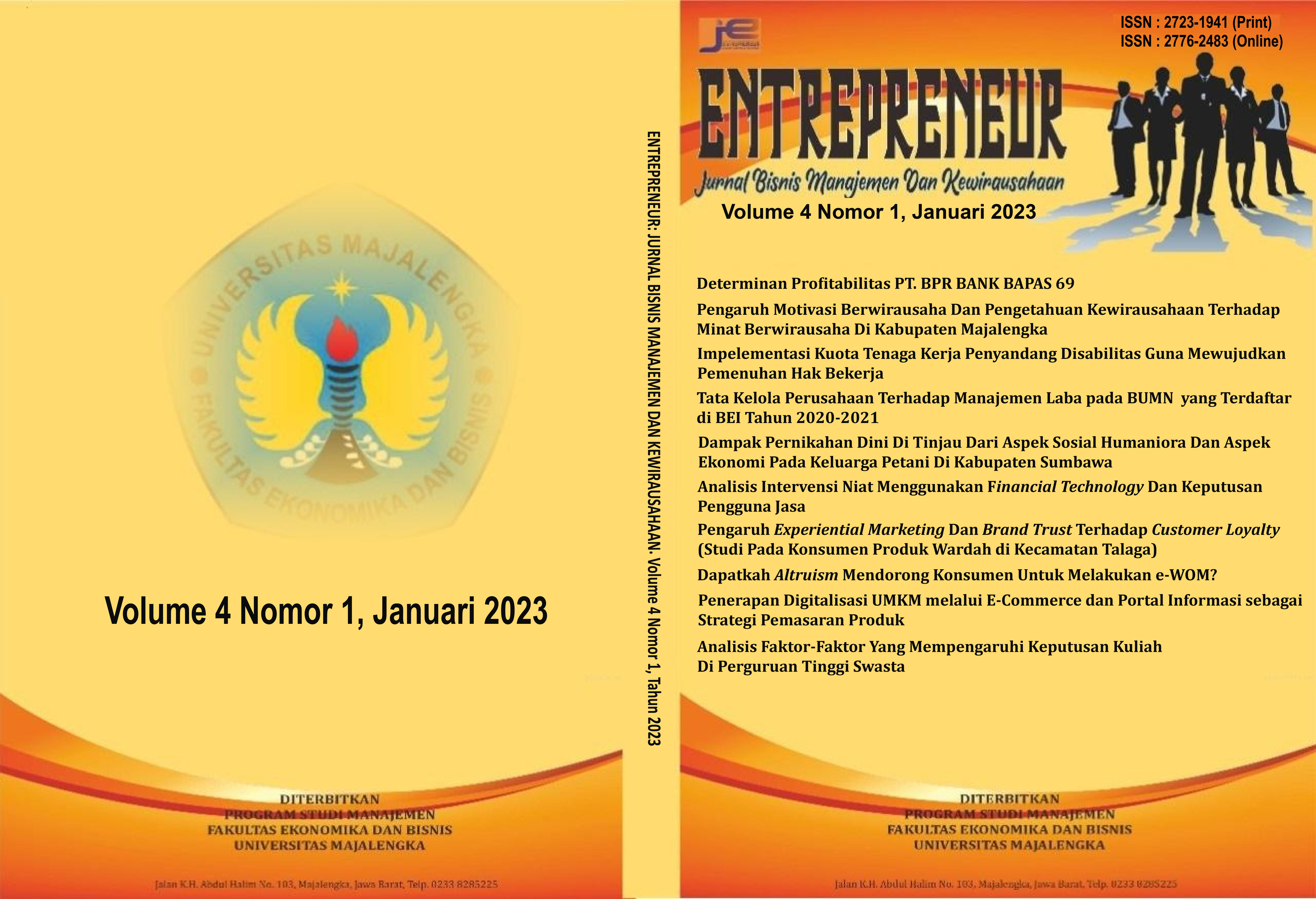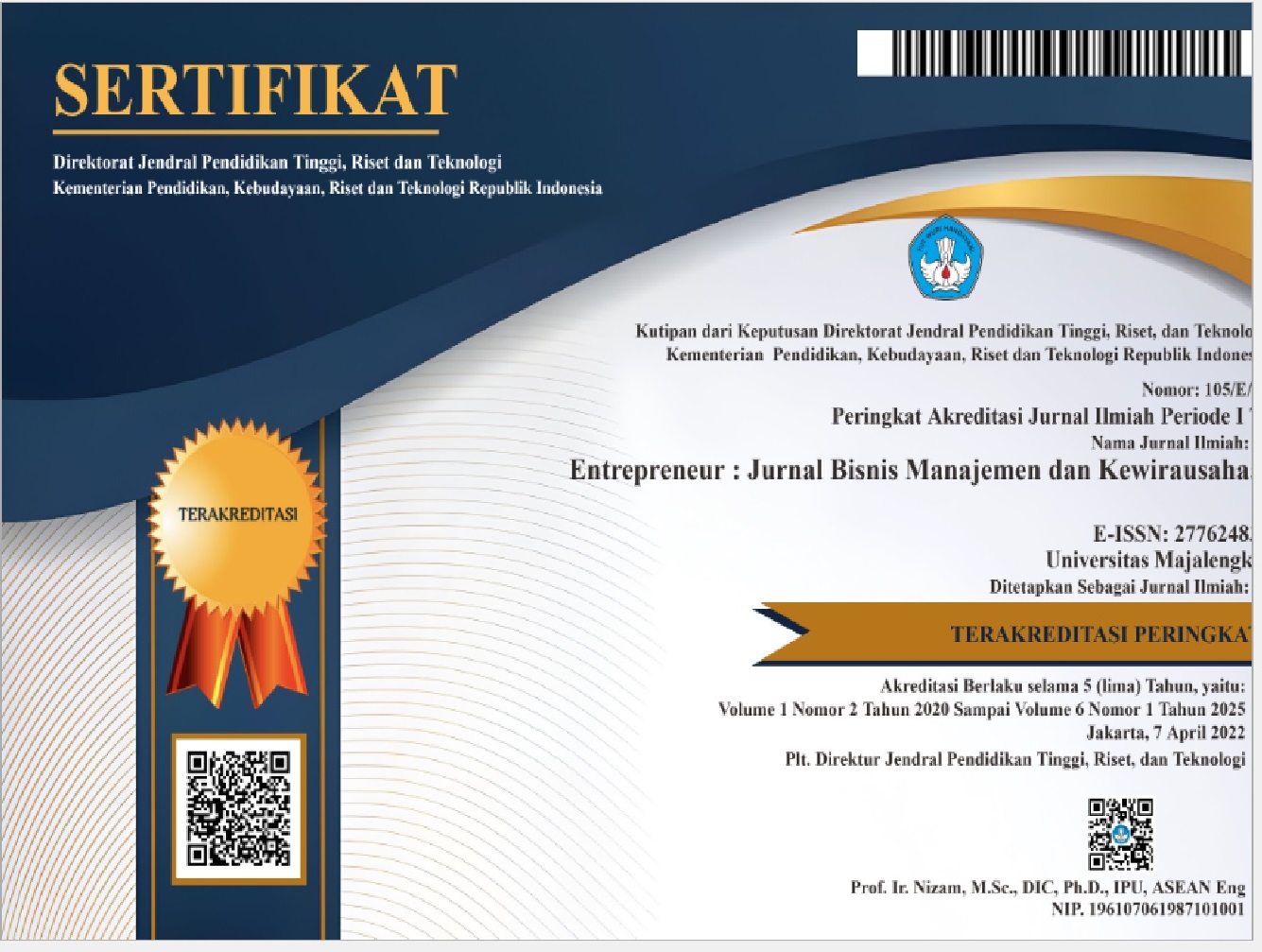Evaluasi Kinerja UMKM Ditinjau Dari Aspek Keuangan Dan Aspek Pemasaran Pasca Pandemi Covid 19
DOI:
https://doi.org/10.31949/entrepreneur.v4i1.3552Abstract
This study aims to provide empirical evidence regarding the importance of evaluating the
performance of MSMEs after the Covid-19 pandemic. Using financial aspects and marketing
aspects, the study tries to examine the extent to which financial and marketing aspects affect the
performance of MSMEs. A total of 75 Batik SMEs domiciled in Pekalongan City participated in this
study. The analysis technique used is multiple linear regression with hypothesis testing.
The results of the study revealed that the financial aspect and the marketing aspect contributed to
the improvement of the performance of Batik UMKM after the Covid 19 pandemic, so that the
proposed hypothesis was supported. The financial aspect has a significant positive effect on the
performance of MSMEs, as well as the marketing aspect has a significant positive effect on the
performance of MSMEs.
Developing countries such as Indonesia see MSMEs as a way out of poverty so it is necessary to
create superior MSMEs so that they can compete in the global market. Great attention through
financial and marketing aspects can realize competitive small and medium scale industries.
Keywords:
Financial Aspects; Marketing Aspects; MSME PerformanceDownloads
References
DAFTAR PUSTAKA
Abor, J., & Quartey, P. (2010). Issues in SME development in Ghana and South Africa. International Research Journal of Finance and Economics, 39(39), 218–228.
Asheq, A. Al, Link, H., The, F., Of, I., & Works, G. (2019). SME Performance : Impact Of Market , Customer And Brand Orientation. Academiy of Marketing Studies Journal, 23(1), 1–9.
Beck, T., & Demirgüç-Kunt, A. (2008). Access to Finance: An unfinished agenda. World Bank Economic Review, 22(3), 383–396. https://doi.org/10.1093/wber/lhn021
Camisón, C., & Villar-López, A. (2010). Effect of SMEs’ international experience on foreign intensity and economic performance: the mediating role of internationally exploitable assets and competitive strategy. Journal of Small Business Management, 48(2), 116–151. https://doi.org/10.1111/j.1540-627X.2010.00289.x
Chang, W., Park, J. E., & Chaiy, S. (2010). How does CRM technology transform into organizational performance? A mediating role of marketing capability. Journal of Business Research, 63(8), 849–855. https://doi.org/10.1016/j.jbusres.2009.07.003
Desarbo, W. S., Benedetto, C. A., & Song, M. (2007). A heterogeneous resource based view for exploring relationships between firm performance and capabilities. Journal of Modelling in Management, 2(2), 103–130. https://doi.org/10.1108/17465660710763407
Fatoki, O. (2017). The Financial Literacy of Micro Entrepreneurs in South Africa The Financial Literacy of Micro Entrepreneurs in South Africa. Journal of Social Sciences ISSN:, 40(2), 151–158. https://doi.org/10.1080/09718923.2014.11893311
Hanggraeni, D., Ślusarczyk, B., Sulung, L. A. K., & Subroto, A. (2019). The Impact of Internal, External and Enterprise Risk Management on the Performance of Micro, Small and Medium Enterprises. Sustainability, 11(7), 2172. https://doi.org/10.3390/su11072172
Kamunge, Njeru A, T. O. . (2014). Factors Affecting the Performance of Small and Micro Enterprises in Limuru Town Market of Kiambu Factors Affecting the Performance of Small and Micro Enterprises in Limuru Town Market of Kiambu County ,. International Journal of Scientific and Research Publications, 4(12).
Karlan, D., & Valdivia, M. (2011). Teaching entrepreneurship: Impact of business training on microfinance clients and institutions. Review of Economics and Statistics, 93(2), 510–527. https://doi.org/10.1162/REST_a_00074
Kevane, M., & Wydick, B. (2001). Microenterprise lending to female enterpreneurs: Sacrificing economic growth for poverty alleviation? World Development, 29(7), 1225–1236. https://doi.org/10.1016/S0305-750X(01)00032-8
Macikov, L., Dorˇ, P., Beug, B., & Markoviˇ, P. (2018). Financial Aspects of Sustainability : An Evidence from Slovak Companies. Sustainability, 10, 1–15. https://doi.org/10.3390/su10072274
Morgan, N. A., Slotegraaf, R. J., & Vorhies, D. W. (2009). Linking marketing capabilities with profit growth. International Journal of Research in Marketing, 26(4), 284–293. https://doi.org/10.1016/j.ijresmar.2009.06.005
Munizu, M. (2010). Pengaruh Faktor-Faktor Eksternal dan Internal Terhadap Kinerja Usaha Mikro dan Kecil (UMK) di Sulawesi Selatan. Jurnal Manajemen Dan Kewirausahaan, 12(1), 33–41. https://doi.org/10.9744/jmk.12.1.pp.33-41
N Venkatraman, V. R. (1986). Measurement of business performance in strategy research: A comparison of approaches. Academy of Management Review, 11(4), 801–814.
Rapilu, W., P.Tanan, E., & Tiffany, P. G. (2021). Strengthening the Financial Aspects , Characteristics and Competencies of Entrepreneurship to Improve the Performance of MSMEs Managed by Women. Advances in Social Science, Education and Humanities Research, 647, 338–346.
Siyanbola, T. O. (2018). Financial Literacy and Owner-Managed Small- Sized Service Enterprises Performance for Lagos Metropolis ’ Sustainable Development. International Journal of Business and Economics Perspectives, 13(1), 18–38. https://doi.org/10.13140/RG.2.2.35408.97280
Slotegraaf, R. J., & Dickson, P. R. (2004). The paradox of a marketing planning capability. Journal of the Academy of Marketing Science, 32(4), 371–385. https://doi.org/10.1177/0092070304265217
Syahsudarmi, S. (2018). Pengaruh Aspek Keuangan dan Modal Manusia Terhadap Kinerja Usaha Mikro Kecil dan Menengah I ( UMKM ) ( Studi Kasus : UMKM di Wilayah Kota Pekanbaru ). Eko Dan Bisnis (Riau Economics and Business Reviewe), 9(1), 66–74.
T Laukkanen, G Nagy, S. H. (2013). The effect of strategic orientations on business performance in SMEs: A multigroup analysis comparing Hungary and Finland. International Marketing Review, 30(6), 510–535.
Vorhies, D. W., & Morgan, N. A. (2005). Benchmarking marketing capabilities for sustainable competitive advantage. Journal of Marketing, 69(1), 80–94. https://doi.org/10.1509/jmkg.69.1.80.55505
Yusfiarto, R., & Pambekti, G. T. (2019). Do Internet Marketing Factors With Islamic Values Improve SME Performance ? Journal of Islamic Monetary Economics and Finance, 5(4), 807–828.

Published
How to Cite
Issue
Section
License
Copyright (c) 2023 Komala Ardiyani, Amalia Ilmiani, Muhammad Maulidin Fachrur

This work is licensed under a Creative Commons Attribution-ShareAlike 4.0 International License.
COPYRIGHT NOTICE
An author who publishes in the Entrepreneur: Jurnal Bisnis Manajemen dan Kewirausahaan agrees to the following terms:
1. Author retains the copyright and grants the journal the right of first publication of the work simultaneously licensed under the Creative Commons Attribution-ShareAlike 4.0 License that allows others to share the work with an acknowledgment of the work's authorship and initial publication in this journal
2. The author is able to enter into separate, additional contractual arrangements for the non-exclusive distribution of the journal's published version of the work (e.g., post it to an institutional repository or publish it in a book) with the acknowledgment of its initial publication in this journal.
3. The author is permitted and encouraged to post his/her work online (e.g., in institutional repositories or on their website) prior to and during the submission process, as it can lead to productive exchanges, as well as earlier and greater citation of the published work







